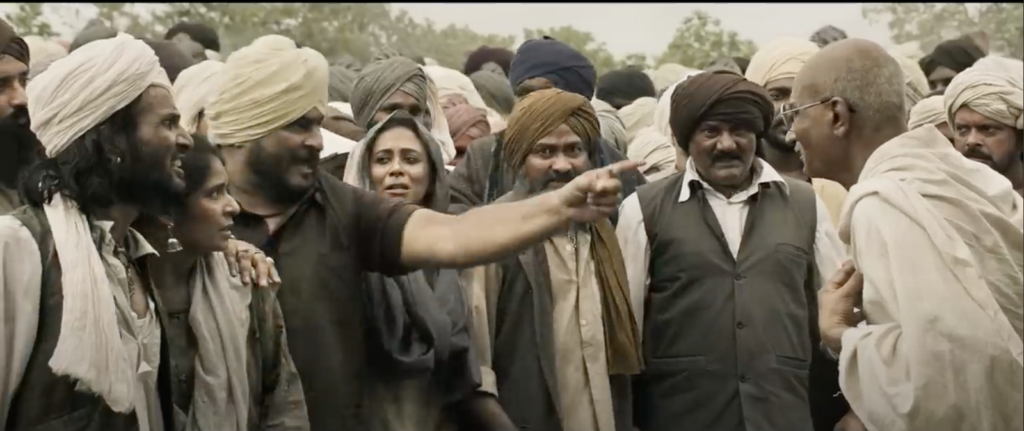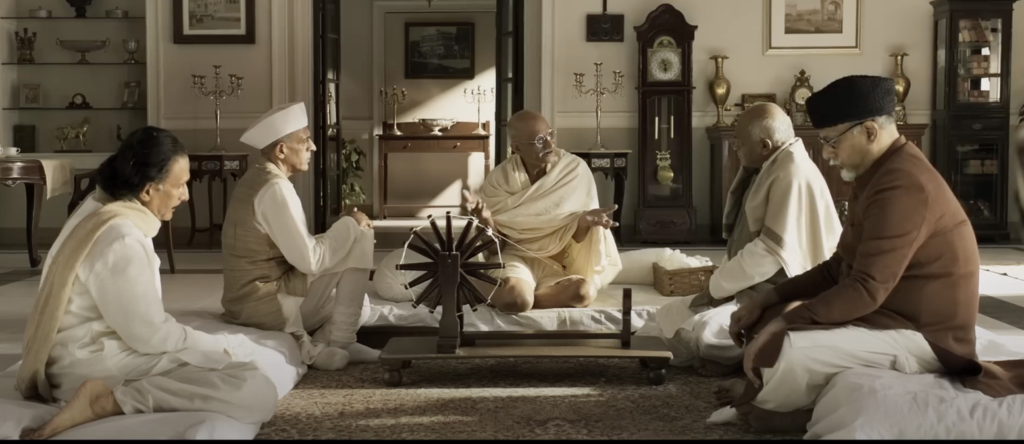
It is genuinely hard to remember when, if ever, I last watched a movie that was two hours of an ideological debate. Of course, this wasn’t a mainstream film, how could it have been, even though the director was once at the centre of the Hindi film industry.
Raj Kumar Santoshi’s Gandhi Godse: Ek Yudh is an almost unbelievable film just by virtue of its existence. No society in the world is ever prepared to debate such delicate and explosive matters, and we certainly are not passing through the best of all possible times. And yet this is when a film like this is required the most. Alas, or maybe thankfully, this film was nearly entirely wiped out by the parallel release of Pathan. This means hardly anyone watched it, but also that hardly anyone could be bothered to be outraged by it and let it complete its run in peace.
Based on a play by Asghar Wajahat, curiously titled Godse@Gandhi.com, the film imagines what would happen if the assassination attempt by Godse on Gandhi’s life failed, and allows both characters to play out their lives, and hence their ideologies, a little longer. Speculative historical fiction is not really something Indian cinema has ever had any interest in, given how attached we all are to certain versions of history. So there is bravery in the filmmaker to show either of these characters in a critical manner. Both sides are given a lot of time to speak their parts (of course, as imagined by the playwright) and to confront the limits of their beliefs.
Gandhi is a much larger figure in history and his life and opinions are documented at an almost flabbergasting level, both by himself and his circle. Godse, on the other hand, is really only known for one thing, and thus erupted in and out of public life very rapidly. Therefore the representation of Godse is much more speculative than that of Gandhi.
While there was much to direct in Godse’s character as presented in the film, I will steer clear of speaking more about him. Instead I want to talk about the real gold nugget in the film, which is the big A. Anarchy.
And there you go, more petrol-soaked rags for your blazing out-of-control fire.

But it’s right there in the film. Gandhi, after India has won her independence, embarks on his next mission and that is to build a society where village self-help groups are the basic building blocks. This is a documented belief held by him, not speculation on the part of the writer. India needed to have a rural de-centralised economic system, and that would likely lead to decentralised governance. And what is a government without a centre? Nothing.
This is where Gandhi becomes a threat to his own compatriots and successors who have formed the new Government of India from August 1947. When he turns his sights and the power of his political leadership on the new exploiters of society, he becomes (ahem) an anti-national. The man who once was a threat to the colonial government through his actions of non-cooperation is the same man who is a dangerous radical for the new, home-grown government.
Though the word is never used in the film, Gandhi is an Anarchist. He prevents governmental development work, obstructs market forces from playing out, circumvents the judgements of courts, and draws the ire of all the powers protected by the constitution. There is no other word to describe him.
It is not in the scope of a film essay to debate the relative merits or demerits of anarchy, but the indubitable fact is that someone like Gandhi, with such deep convictions about what path Indians should adopt, and backed by the reputation to convert millions to his cause, would become a threat to the very nation that he helped birth.
In his essay on the film, Mayank Shekhar makes a powerful observation that, “The posthumous effect of his action/thoughts on other global movements, countering injustices, and speaking truth to power was such that if Gandhi didn’t exist, we’d have to invent him.” Let me add my own bit to that – if Gandhi hadn’t been assassinated on 30th January 1948, the nation would have had to kill him.
–
Gandhi Godse: Ek Yudh (2023)
Directed by Rajkumar Santoshi
Story by Asghar Wajahat
Language: Hindi
–
Thanks for reading my essay. Your interest gives me enormous motivation to keep on writing. If you have any comments I’d love to read and respond to them. And if you want to read some of my other works then head over to www.amazon.in/Sumit-Ray/ where you can see some of my fiction writing, and also a book of essays on Satyajit Ray’s entire fiction filmography.
Leave a Reply